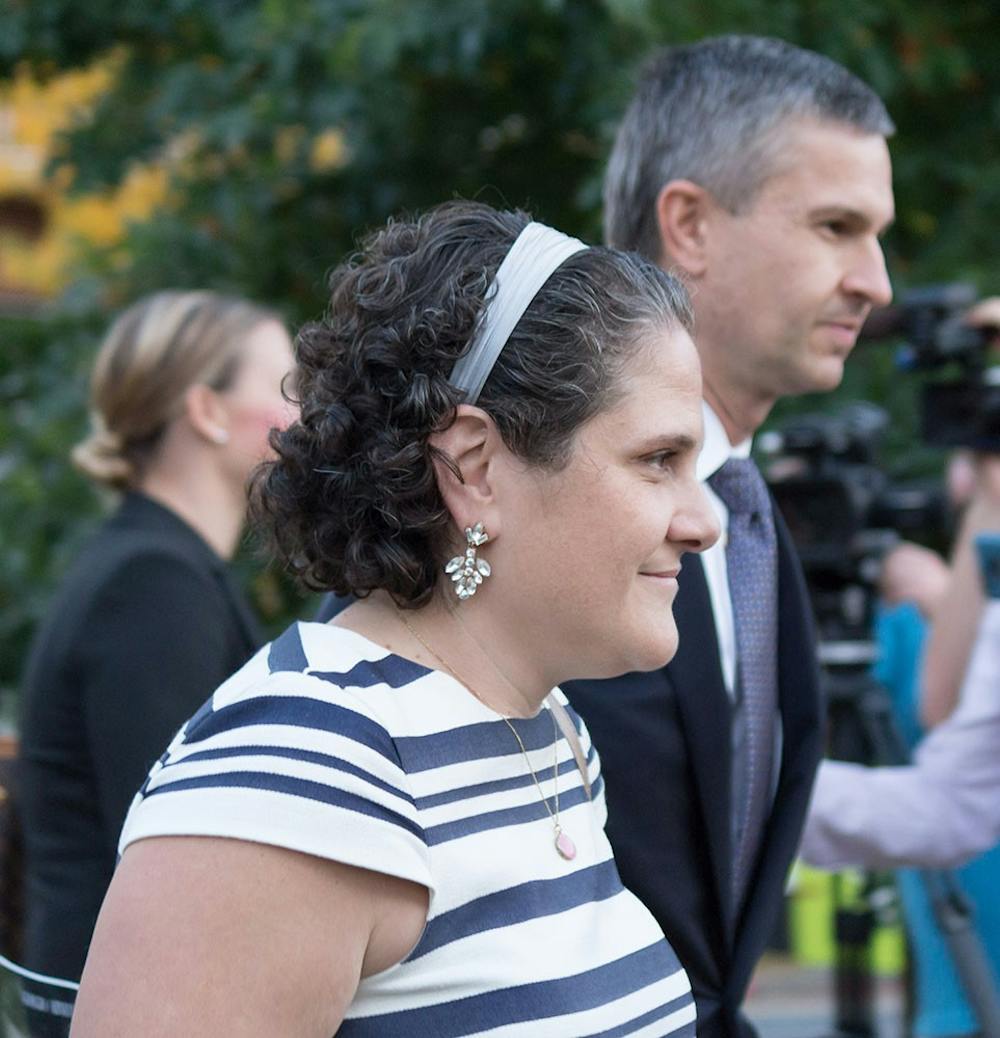“I’m sorry if this hurt you in any way,” Rolling Stone magazine Deputy Managing Editor Sean Woods said, looking down at former Associate Dean Nicole Eramo from the stand.
Woods participated in his second day of testimony Thursday, speaking about his own editorial failings in the 10th day of the trial for Eramo’s $7.5 million defamation suit against Rolling Stone, Wenner Media, Inc. and “A Rape on Campus” author Sabrina Rubin Erdely.
Woods struggled to answer a question from Eramo’s attorney Libby Locke regarding whether the article — which Eramo says depicted her as uncaring and indifferent toward Jackie, a victim of an alleged gang rape — damaged Eramo.
Jackie’s claims were found to be unsubstantiated by a Charlottesville Police Department investigation.
Locke reiterated her question and Woods said he thinks Eramo was hurt by the article, but maintained that he believes she is a public figure subject to criticism.
“I thought Jackie was rock solid. I thought we had a rock solid source,” Woods said shortly into his Thursday testimony.
Woods admitted that leading up to the article’s publication, he did have concerns regarding sourcing of the article.
“I worry that we can’t confirm the two girls coming to Jackie,” Woods said in an Oct 25., 2014 email regarding Jackie’s claim that two other University students had been gang raped at the Phi Kappa Psi fraternity house. The only source Rolling Stone had regarding these women were screenshots of texts Jackie had sent Erdely.
Locke said the screenshots of these alleged text conversations between Jackie and the women in question had the name “Jackie” at the top of the iPhone conversation, something which would have never occurred in a real conversation with these women.
“I thought that’s how you forwarded texts,” Woods said.
Woods accepted blame for another mistake — allowing Erdely to attribute a quote to Kathryn Hendley, referred to as “Cindy” in the article, without contacting her.
“That’s a legitimate criticism and I accept that,” he said.
Throughout his testimony, Woods said while he made numerous mistakes and failed to push Jackie harder for the truth, he does not believe Eramo was portrayed as anything other than helpful to Jackie.
“I think we saw [Jackie] as a victim and let our guards down because of that,” he said.
At one point following the debunking of Jackie’s story, Woods had unsuccessfully offered to resign from his position at Rolling Stone.
Scott Sexton, the attorney for Rolling Stone, questioned Woods about Jackie’s credibility and Erdely’s process of investigation.
“I would never let a story go forward that I didn’t have confidence in,” Woods said.
Throughout the late morning and afternoon, Sexton asked Woods whether he agreed with parts of the Columbia Journalism Review’s biopsy of the Rolling Stone article.
“Do you agree [with the statement], ‘Ultimately, we were too deferential to our rape victim; we honored too many of her requests in our reporting’?” Sexton asked, using a quote from Woods in the CJR analysis, to which Woods responded, “Yes.”
Woods also said he had nothing against Eramo.
“Did you imply that this was all on Eramo?” Sexton asked Woods.
“No,” Woods responded, arguing the article implied that Eramo was “calm and professional” during her experiences with Jackie.
Woods emphasized throughout his testimony that he did not intend to cause any harm and was unaware of any faults in Jackie’s allegations at the time.
“I don’t think I fully understood the scope of the manipulation,” Woods said.
Sexton also asked Woods about the aftermath following the article.
“There was a lot of soul searching,” Woods said. “I don’t know if any of us recovered.”
University alumna Sara Surface also took the stand Thursday and described how she believed Eramo was misrepresented in the article.
“I could see the extent to which she was dedicated to sexual assault prevention and supporting survivors,” Surface said, reflecting on her time in student sexual assault prevention group One Less and her willingness to refer sexual assault survivors to Eramo.
Surface was a source for Erdely’s article, which Surface said she believed was going to address campus rape culture more generally at the time Erdely first interviewed her. She said she had hoped to discuss sexual assault resources and the advocacy work she was involved in.
Surface’s work with sexual assault advocacy groups was not noted in “A Rape On Campus.” Instead she was only quoted as saying, “I don't know many people who are engrossed in the party scene and have spoken out about their sexual assaults.”
When asked to recall her reaction to the article when it came out, Surface described seeing the photoshopped image of Eramo with protesters in the background.
“S—t, this does not look good,” Surface remembered thinking about the image, which has been a point of debate between Eramo and Rolling Stone about whether it intended to cast Eramo in a negative light.
In response to an assertion Erdely had previously made that Surface was a “covert mouthpiece for the administration” due to her general support of the University’s administration and its work with sexual assault groups, Surface said she thinks Erdely disregarded her advocacy work and positive view of Eramo because they didn’t “fit the narrative” of an indifferent administration.
“If [Erdely] had listened to my personal experiences and my feelings, maybe she wouldn't be getting sued right now,” Surface said.
Court resumes Friday, and the jury is expected to hear testimony from former Rolling Stone Managing Editor Will Dana and publisher Jann Wenner.







